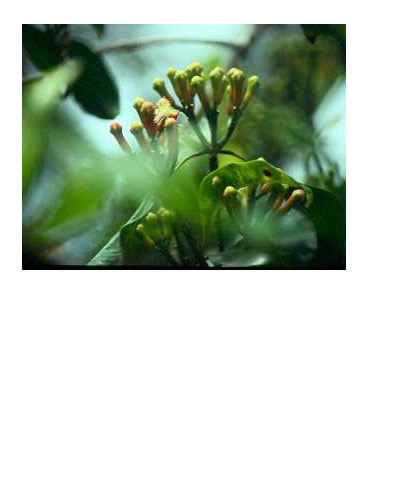Laung
Latin: Caryophyllus Aromaticus
Therapeutic Action:
Myrtaceae Pharmacological Action: stimulant, carminative, stimulant (peristalsis), germicide, antiseptic, anaesthetic, expectorant, astringent, yogavahi Indications (Uses): nausea, gas, emesis, slow digestion, dyspepsia, slow peristalsis, toothache, phthisis, bonrchial troubles, Attributed Medicinal Properties Cloves contain 15 to 20% essential oil which is mostly Eugenol which is a very strong antiseptic. Clove oil is often applied directly to an aching tooth, bringing immediate relief. Compounded with zinc oxide, it has been used in dentistry as a temporary tooth filling. It is a strong stimulant and carminative and used to treat nausea, indigestion and dyspepsia. ---Medicinal Action and Uses---The most stimulating and carminative of all aromatics; given in powder or infusion for nausea emesis, flatulence, languid indigestion and dyspepsia, and used chiefly to assist the action of other medicines. The medicinal properties reside in the volatile oil. The oil must be kept in dark bottles in a cool place. If distilled with water, salt must be added to raise the temperature of ebullition and the same Cloves must be distilled over and over again to get their full essence. The oil is frequently adulterated with fixed oil and oil of Pimento and Copaiba. As a local irritant it stimulates peristalsis. It is a strong germicide, a powerful antiseptic, a feeble local anaesthetic applied to decayed teeth, and has been used with success as a stimulating expectorant in phthisis and bronchial troubles. Fresh infusion of Cloves contains astringent matter as well as the volatile oil. The infusion and Clove water are good vehicles for alkalies and aromatics. Remedies For: Anodyne, antiemetic, antiseptic Toothache, oral hygiene: Dentists use clove oil as an oral anesthetic. They also use it to disinfect root canals. Antiseptic Uses: Clove oil is the active ingredient in several mouthwash and a number of over-the-counter toothache pain-relief preparations. Infection fighter: Clove kills intestinal parasites and exhibits broad antimicrobial properties against fungi and bacteria supporting its traditional use as a treatment for diarrhea, intestinal worms, and other digestive ailments. Digestive aid: Like many culinary spices, clove may help relax the smooth muscle lining of the digestive tract. Clove oil will stop the pain of a toothache when dropped into a cavity. A few drops of the oil in water will stop vomiting, and clove tea will relieve nausea. Eating cloves is said to be aphrodisiac.
References:
- Paranjape Pages 159-160
- Duke's Pages 468-469
- Nadkarni, Vol I, P 835- 838
Used in:
- Livonex Tablets
- Unexozim Tablets
- Unitex Forte Tablets
- Unitex Forte Capsule
- Entrox Syrup
- Unexotone Syrup
- Coldex Ointment

Copyright 2013 Unexo Laboratories Pvt. Ltd. All Rights Reserved. Designed & Developed By: Credence Technologies


